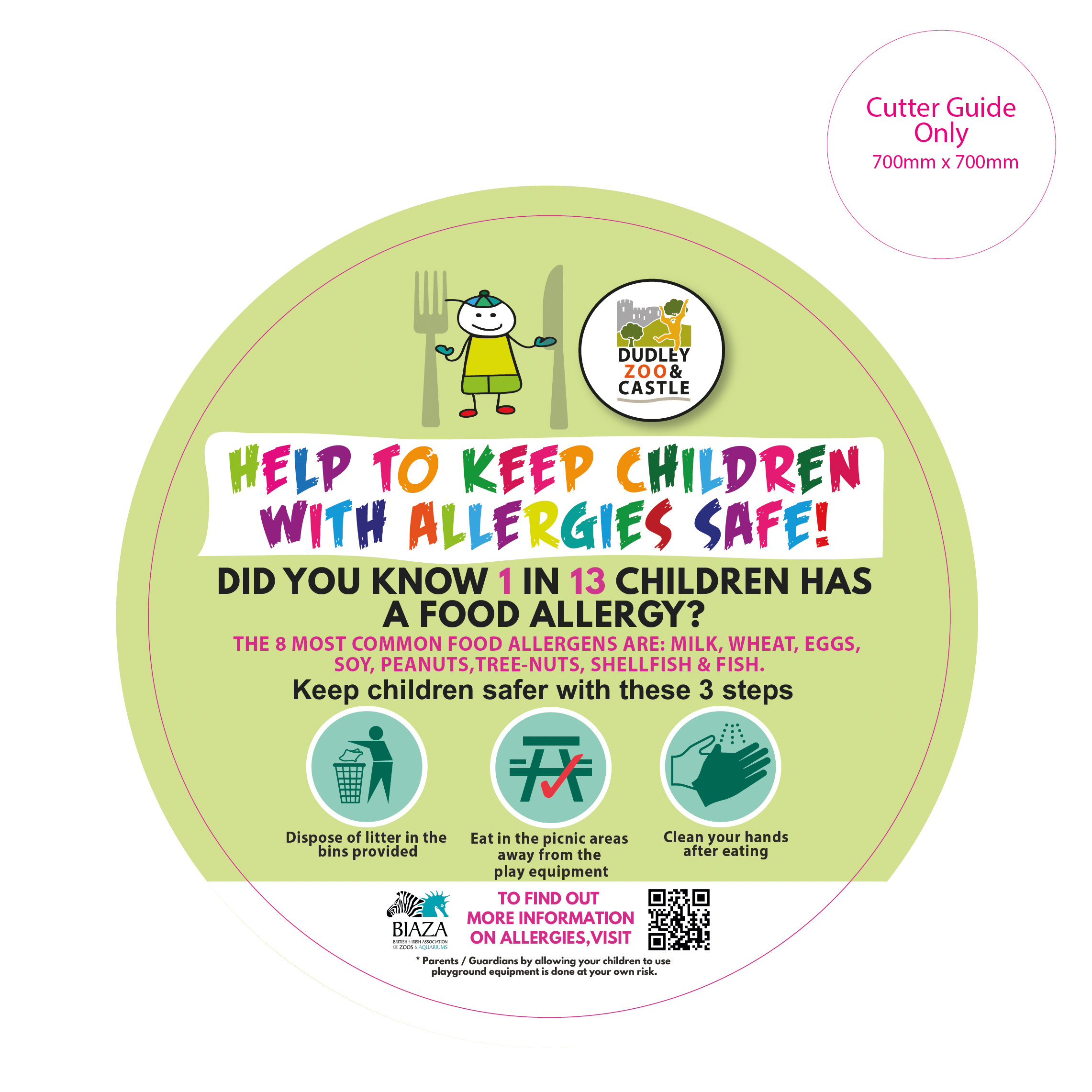Jodie Dryden, Dudley Zoo and Castle, writes about the frequently unconsidered yet life-threatening issue of allergies, and the engagement which won them a Gold BIAZA Award in Diversity and Inclusion for 2023.
Prior to having my son, Jasper, if I heard someone say they were allergic to something I would of likely presumed they would break out in a rash, I definitely would not have thought it could mean losing a life. Now, I don’t go a day without dealing with allergies and constantly worrying about anaphylaxis.
When I was pregnant, I used to worry about the dangers that every first-time parent does. Will I do a good job? Will I know if he’s poorly? What if he’s too hot? too cold? hungry?
I never thought I’d have to worry about simply feeding my child or letting my child him play.
Jasper was diagnosed as being allergic to cow’s milk at three months-old after battling with severe eczema and constant feeding issues.
Now aged four he is currently anaphylactic to cow’s milk, eggs, nuts, peanuts, celery, fish, crustaceans, shellfish, kiwi and soya, which means if any of these products are given to Jasper, he would go into full anaphylactic shock and without the use of an EpiPen would die.
And what makes it more complicated is that he’s also reactant through touching his allergens, something I found out on my first Mother’s Day in 2020, when I spilt a cup of tea on my jumper and when I picked him up, his skin came out in hives.
So, wherever Jasper goes, so do his two EpiPens.
As a parent of a child with multiple severe allergies, we have to be vigilant in every single thing that our child is involved in, from a trip to the park or soft play, eating out, to being looked after by others. From starting school, going for a walk, popping to the shops, having his hair cut, a trip to the beach, to even simpler things like breakfast, lunch and dinner and even washing his hands, as the slightest slip up could cost my son his life.
It’s normal for us to follow him on the park or in play equipment checking every nook and cranny for discarded chocolate wrappers or hidden food.
For a long time, we avoided places like this through pure fear, and its only now at the age of four the’s fully aware himself of the dangers and what he cannot touch and will make us aware if there’s any discarded food items or wrappers.
Having experienced the feeling of being anxious at play areas, parks or on a days out, I realised that I’m in a position to make a difference to visitors coming to the zoo with allergies.
I proposed adding signage around the zoo site, a small change that would give other allergy families some comfort and the feeling of inclusion when visiting.
The zoo agreed to produce the signs and install them on all of our play areas around the zoo and castle.
The colourful signage explains in three steps how to keep children safe:
1. Disposing of litter.
2. Eating at picnic tables and not while on play equipment.
3. Wash your hands after eating.
We’ve also added QR codes which link to the NHS website which explains about allergies, the causes, and then medical advice for dealing with mild to serious reactions, as well as a direct link to the Natasha Allergy Research Foundation which has information about their campaign, current research, as well as stories of families living with allergies.

Since the signage was put in place prior to last summer, we’ve received fantastic feedback from allergen families and photos of the signage has been shared with allergen groups across the country.
We’ve also been contacted by other attractions wanting the design and have been thrilled to see our actual signage in-situ at another BIAZA collection.
Now that we have spearheaded the campaign, we are hoping that more BIAZA collections will add similar signage to their sites.
If this is something your collection would like to consider doing, please contact [email protected]
- Jodie Dryden, Team leader – Lower primates, Dudley Zoo and Castle.
All blogs reflect the views of their author and are not a reflection of BIAZA's positions.
Related Members
-
News
.png?w=100&h=100&zc=1&f=jpeg&hash=65ba18ab3dddd57e0f31f999ec4849db) Double baby joy at Paignton Zoo as second rare white monkey born 11th February, 2026Paignton Zoo is celebrating a rare double baby boom after welcoming a second endangered king colobus monkey this winter, marking the zoo’s first…
Double baby joy at Paignton Zoo as second rare white monkey born 11th February, 2026Paignton Zoo is celebrating a rare double baby boom after welcoming a second endangered king colobus monkey this winter, marking the zoo’s first… -
News
.png?w=100&h=100&zc=1&f=jpeg&hash=92e90cf6a944ad40ff665483a5744aa4) Blog: Zoos have a duty to source their plants sustainably 10th February, 2026Do you know where your purchased plants come from? In our latest blog, the BIAZA Plant Working Group details how zoos/aquariums can work together…
Blog: Zoos have a duty to source their plants sustainably 10th February, 2026Do you know where your purchased plants come from? In our latest blog, the BIAZA Plant Working Group details how zoos/aquariums can work together… -
News
.png?w=100&h=100&zc=1&f=jpeg&hash=efca54c8656a2a8e0fe3cae0dedb16ba) 4,000 Recycled Festive Firs Fuel Fun for Animals at Noah’s Ark Zoo Farm 10th February, 2026Noah’s Ark Zoo Farm, a Zoo and conservation charity in North Somerset, has celebrated the success of its hugely popular annual Christmas tree recycling…
4,000 Recycled Festive Firs Fuel Fun for Animals at Noah’s Ark Zoo Farm 10th February, 2026Noah’s Ark Zoo Farm, a Zoo and conservation charity in North Somerset, has celebrated the success of its hugely popular annual Christmas tree recycling…



